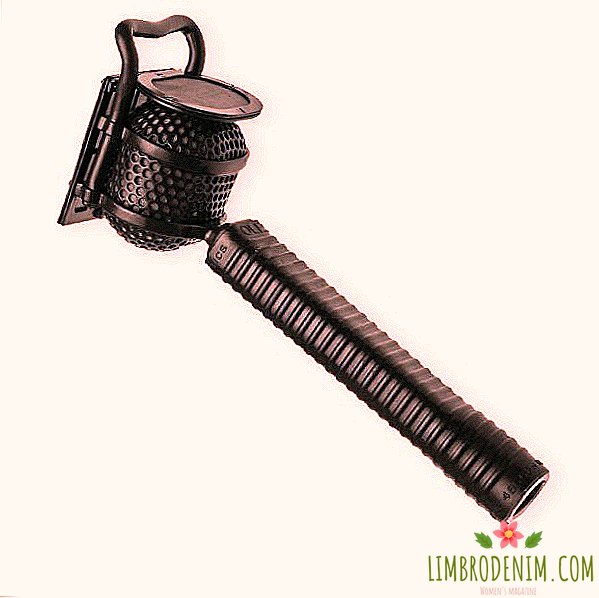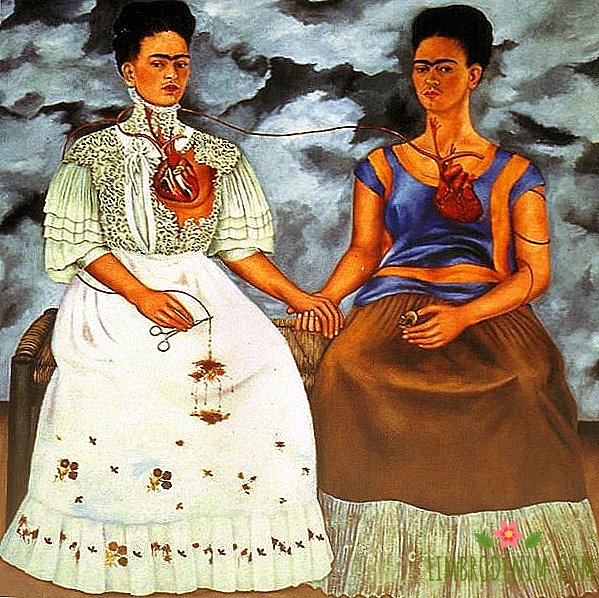Invisible Bear: How I Handled Panic Attacks
You may have heard of panic attacks. only in the film "Iron Man - 3" (they were with Tony Stark), but many people face them every day. It is a state of intense anxiety, fear or, in fact, panic, and it is much stronger than the usual excitement that almost everyone faces. A person has a persistent feeling that he is going to die or that he is losing touch with reality. To this are added rapid pulse, difficulty breathing, or the feeling that a person is about to suffocate, dizziness, nausea, confused thoughts, and sometimes all at once. Such attacks occur with different regularity, always suddenly and often as if for no apparent reason - most often they last from five to twenty minutes. Psychotherapy helps to deal with panic attacks - they can be a symptom of the corresponding disorder or other conditions. Maya Lace (the name was changed at the request of the heroine) told how she lived for ten years with panic attacks and how she coped with them.
Interview: Irina Kuzmichyova

Adrenaline and the fear of death
I was born in Riga. I had bilateral dysplasia (that is, congenital dislocation) of the hip joints, but the doctors did not notice anything at birth, and my parents did not pay attention until I tried to walk. After that, I was in hospitals for a couple of years - otherwise I would have walked with crutches, probably. In the 70s, the children in the hospitals were alone, their parents were not allowed to them: I remember how I, the two-year-old, were being taken for an operation, as I was alone in intensive care and I was terribly scary. In two years, I had four surgeries, two on each joint. Each time they put plaster to the armpits for several months. I think the roots of my panic attacks grow from there.
The first panic attack took me by surprise. It happened when I was about eighteen - I have no idea why. I looked at myself in the mirror, and it seemed to me that I was about to die: it was terribly scary, I was shaking like an aspen. Most of all, I was scared of this feeling of death: it seemed, right now, in a couple of seconds I would drop dead - but I did not fall, but the terrible feeling did not pass. I called my mother, she laid me on the sofa, asked that with me - I replied that I was going to die. Mom called an ambulance - in twenty minutes, when she arrived, I felt a little easier. They listened to me, knocked, said that everything is fine. They injected a sedative and left.
Subsequent attacks were about the same, and each time I asked my mother to call an ambulance - this was done five times. In addition, I went to the polyclinic to be checked, took blood tests and did a cardiogram - but what else was there at that time? They said: "Healthy girl" and "Never mind." They wrote “vegetovascular dystonia” on the card, advised “to drink valerian” and sent them home.
During a panic attack, adrenaline is released to the blood. This function is necessary for survival (adrenaline causes the body to go and run. - Note ed.) - if you met a bear in the forest, you would feel the same way. But for some, this function is impaired, and the "invisible bear" can appear to the brain in any setting. In addition, I had enough adrenaline since childhood. Dad went into a binge, drove everyone out of the house. After another scandal, my mother tried to commit suicide when my sister and I were at home.
Visible reasons are not needed for a panic attack, it can cover at any time. I sit, admire nature and birds, and the next moment it seems that I lose consciousness, and my heart begins to jump out of my chest. Usually panic attacks last fifteen to twenty minutes, sometimes they lasted for hours with me. I was so afraid of these sensations that I myself increased my fear and, therefore, adrenaline rush. It would be better for me to break my hand every time than to go through it again.
There were nightly attacks: I slept quietly, everything seemed to be fine, but I woke up in the middle of the night with the feeling that it was “beginning.” The pulse grows, the tongue grows numb, the hands are shaking, fog in the head, the legs are cotton. I started to walk around the room and could not find a corner, it was bad everywhere. I wanted to leave, call an ambulance, shout for help - it seemed that everything would be over now. I tried to count the pulse, lost, counted again - he was under two hundred beats. I thought that, probably, the heart would not stand it. I was afraid that there would be a heart attack, I tried to calm down, but I could not - and everything was going on a new circle. In the US, such a cycle is described as "fear - adrenaline - fear" ("fear - adrenaline - fear"). When you learn to interrupt this circle, it means that you are on the mend.
Diagnosis and Medication
By the age of twenty, my panic attacks had practically disappeared - they passed by themselves. Then I lived in the United Arab Emirates for several years, worked as an administrator in a dental clinic - most of the time there, too, everything was quiet. There I met a Russian who lived in New York. He offered to move: "Come here, after all America." I took the risk and flew to New York in 2001.
We were always shown Manhattan on TV, but do you get there? When I saw Brooklyn, I drove a lump to my throat: terrible dirt, overflowing trash cans, homeless, old scary houses with small windows. Two years passed before I saw and realized the beauty of New York, but for the newcomer it was a shock. My boyfriend’s apartment was creepy too. He worked as a manager in the store. A few days later I learned that he was using heroin.
Every morning I woke up on a bunk bed with a sawn-off top and wept. She stopped writing to her friends - there was simply nothing to say. She called home to her mother, chatted in a cheerful voice, and then she put the phone down and wept without stopping for two hours. It was a shame. Now I remember and I think that it was stupid, I had to leave. But I could not step over myself, could not show others that I was in trouble. I did not expect to be so scared and lonely.
Attacks surged with a new force - it was the most intense period. I worked in a small office an hour from home. She scrambled to the end of the last car and rode with tears in her eyes and a lump in her throat. I had very strong panic attacks in the subway. Once it was so bad that it was scary to even remember. Then I went out to the busiest station, halfway to one of the many exits, I thought: that's it, now it’s exactly the end. On the wadded legs climbed into the street, took a taxi home. Shaking, pressed against the seat, trying to start a conversation with the taxi driver. I understood that I urgently need to switch, and then with my fears I’ll bring myself to a faint. Later I read that this happens rarely during a panic attack, although many people have the feeling that this will happen. I still dislike metro.
I also became afraid of shops. They were too loud, I felt dizzy, and I was afraid of another seizure - I wanted to hide in a corner or run away. More often I just left, sometimes right from the queue. It seemed that I would faint and everyone would look at me. Again, I read later that I did the wrong thing: if you avoid crowded places, with time you can be a prisoner of your own apartment, it will be scary to go out. You do not have to throw yourself in the middle of the supermarket and come what may - you can start a little: stand for two minutes at the exit and leave, then stand for five minutes. Gradually - let it take weeks - the body gets used. The main thing is not to give up.
She called home to her mother, chatted in a cheerful voice, and then she put the phone down and wept without stopping for two hours. It was a shame
Then I studied in absentia in a British university. I looked into books, read the same paragraph ten times and could not remember anything. I had to take an exam at the British consulate, but I wrote to the teacher that I could not continue my studies. I lived almost half starve: my drug addict partner took all the money. Then, on nervous grounds, I got an eating disorder: I bit a slice of bread and I was terribly nauseous, it seemed that I was full. I have lost a lot of weight.
I had no insurance, no money to go to the doctors, either. I began to look for information on the Internet and realized that I had panic attacks. Once I was advised of a sedative, which was used by our grandmothers - I bought it from the Russians in Brighton right on the street, a small bottle cost twenty dollars. I was getting calmer because there was at least some medicine.
I came to a psychiatrist two years later. He diagnosed me with anxiety disorder with panic attacks. Everything fell into place - finally I have a diagnosis, not an unknown disease. The psychiatrist introduced me to an anti-anxiety drug, an anxiolytic: I gave a small dose and told me to put the drug under my tongue when I felt bad. The drug helped to reduce the frequency of attacks, but they still did not completely pass. The tool quickly calms down - I wanted not only to calm down, but to get rid of attacks forever.
I started going to psychotherapists. They talked about breathing, doing yoga, meditating, but they did not give specific advice about the attacks themselves. I did not see a patient with a big problem, they thought that there were no "deviations", so they just chatted about life or asked about my childhood. I did not have extra money to talk, but I did not want to talk about my hospitals and papins. Why remember this? Someone talk helps to throw the burden of the past from the shoulders, but not me. I want to forget this nightmare.
In two years I have visited six or seven specialists: I spoke with someone only once, to someone for several sessions. Since they did not help me, I decided to try antidepressants. I was discharged from them, but after a couple of days I began to have nightmares about how I cut someone's bodies. After a week I began to be afraid to go to bed, after three I refused these pills. Then another psychiatrist wrote me new antidepressants, but again they had terrible side effects: constant goosebumps under the skin, my head did not understand anything - I worked with numbers, looked at the monitor and did not understand what was happening. I barely had enough for two weeks, and I decided that I would no longer experiment with the body.

Slow breathing and poems
I found a forum in which people like me were sitting. There, I splashed out my despair, and they supported me. They also advised special literature - I bought books and they helped me a lot. I received most of the information from there: in one I read about the respiratory system, in the other - about muscle relaxation, I tried everything on myself. I made bookmarks and during the attack read like a mantra: "A healthy person's heart can beat at a speed of two hundred beats per minute for many hours." I also often googled “can I die from a panic attack” and every time I saw that no, no one dies of panic attacks. I also clung to this straw.
One evening, back in Riga, during a panic attack, I was shaking under two blankets. Mom sat down next to her and said: "Let's pray. Repeat after me," Our Father "." So I learned the prayer. Then it seemed that it helps, but now I know that any poem can help me. We must distract the brain, stop listening to yourself, to the symptoms. It is almost impossible to think about something else, but you can force yourself to read poetry. I loudly told myself about everything that I saw: “I see a black TV, on the street one-two-three-four-five trees ...” If there is a close person who knows about panic attacks and understands, you can call him, just talk - not about attacks. At first it may seem that it does not help, you want to hang up, but you have to force yourself to listen to a friend: the brain switches to something else from a panic, the “adrenaline - fear - adrenaline” circle is broken.
The attack can grow like a snowball. I realized that if I learned to ignore the symptoms, they would not go further than the first phase. I read that the best way to get rid of panic attacks is to forget them. Then it seemed to me: yeah, try forget it here. But in fact, it is: the less attention, the easier it will be to pass. And in the end will be completely.
If the attack is especially strong, the quickest way for me to slow down the heartbeat is to breathe correctly. Someone breathes in the bag - but, by the way, people with heart problems cannot do this, so you need to know for sure that this is really a panic attack, and not other problems. At first it is hard, there is not enough air, but if you hold your breath for two or three seconds, you can reduce the pulse.
I told myself: "It's just adrenaline in the blood, it's just a feeling, it will pass now. I'm all right"
The main thing during a panic attack is to stop being afraid. I told myself: "It's just adrenaline in the blood, it's just a feeling, it will pass now. I'm all right." It is necessary to remove from the head “what if” - nothing “suddenly” happens. You shouldn’t count the pulse - I spent several years with my hand on the pulse, until I realized that this did not help me, but vice versa. And do not be afraid of the symptoms - they do not make you "abnormal."
There are many ways to cope with panic attacks, but there is no magic advice. One will be helped by antidepressants, others by classes in the gym, someone needs an hour jogging at six in the morning, someone meditating. Some are helped by a rubber band on the wrist: you need to carry it with you and put it on your arm during a panic attack, pull it off and clap your hand. The brain switches to pain. I sometimes tweaked the space between thumb and forefinger. We must look for your way. But the books are useful, they explain what's what. If I had known about them before, my road to recovery would have been much shorter.
Panic attacks can go away, but they can come back, even after a few years. You can be offended to think: "Well, how is it, why again?" But the main thing is not to pay attention: if they already were, you know them, there is nothing new in them. For ten years I had them with interruptions. I thought for too long that they themselves would pass, I thought I had some kind of disease unknown to science. The road to recovery was a long one. I can not say what exactly helped me - probably a set of techniques and knowledge.
The panic attacks took about five years, until I became pregnant - it turned out that if the attacks happened earlier, then due to hormones they can manifest themselves during this period. So I did: during both pregnancies I had two or three attacks. They did not return again, but for several years I always carried with me pills "just in case": the fear that the attacks would return, held on for a very long time. But for about eight years, I live in peace.
Photo: veleri_kz - stock.adobe.com (1, 2)





